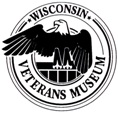Albert C. Morse Papers and Photographs
1861-1925
WVM Mss 80
0.2 linear ft. (1 archives box) of papers and (1 folder) of photographs.
Wisconsin Veterans Museum
(Map)
Papers and photographs pertaining to Albert circa Morse, a Tafton, Wisconsin resident who served with Company F, 7th Wisconsin Infantry Regiment during the Civil War. The majority of the collection includes letters written by Morse to his family during his service. The correspondence describes being stationed at Camp Arlington (Virginia), his stay in the Fairfax Seminary Hospital, being wounded at the Battle of the Wilderness (Virginia), and participating in the Richmond-Petersburg Campaign. Morse also talks about daily life as a soldier, rations and health, and rumors of future military engagements. Morse apparently became sick in 1862 and had an extended stay in the Fairfax Seminary Hospital, where he served as a dining steward. He writes of seeing the men with missing limbs and “fly blown” wounds after the Second Battle of Bull Run (Virginia) and writes that it is “enough to make a man sick of war.” Other interesting points include his discussion on fraternization with Confederate troops to obtain tobacco; the problems of integrating new recruits into veteran regiments; his favorable opinions of General George McClellan, as both general and politician; gambling amongst the troops; and his opinions about African-American soldiers. Morse also requests news from home and urges the family to write often. The collection also includes two letters written by relatives of Morse to other family members; one letter written by Morse's brother, Cassius, who served with the 1st Wisconsin Heavy Artillery, and the other letter written by Morse's cousin, Philander B. Wright, who served with Company C, 2nd Wisconsin Infantry Regiment. The letter from Wright (September 22, 1862) was written while he was recovering in a hospital after being wounded during the first day of the Second Battle of Bull Run. In the letter, Wright states that he last heard that Morse was at Fairfax Seminary Hospital, that McClellan was being held back from success, and expressed intense anger that foreigners were not enlisting to fight in the war. He also mentions being wounded at Second Bull Run and that he has not heard how his Company fared after the Battle of Antietam. The letters were transcribed by decedents of Morse and transcribed copies are included in the collection. Photographs include an original image depicting an elderly Morse posing with his sons, and copy print portraits of a younger Morse.
English
http://digital.library.wisc.edu/1711.dl/wiarchives.wvm-mss00080 ↑ Bookmark this ↑
